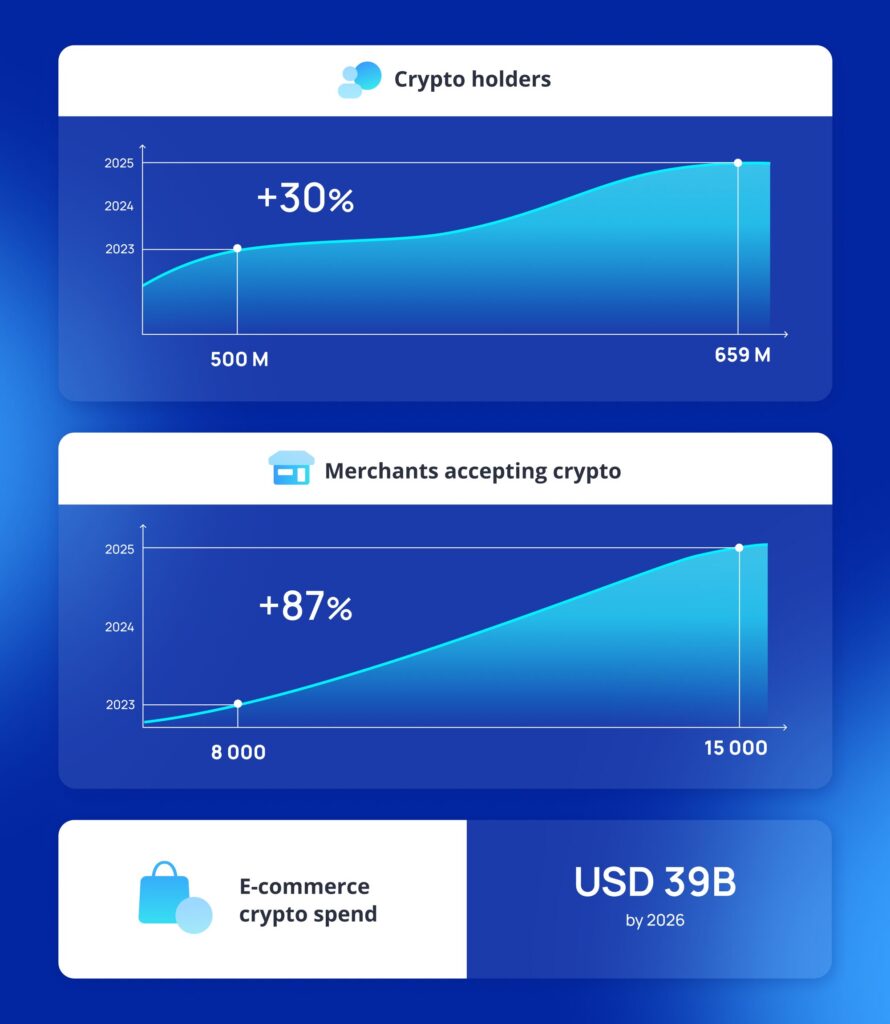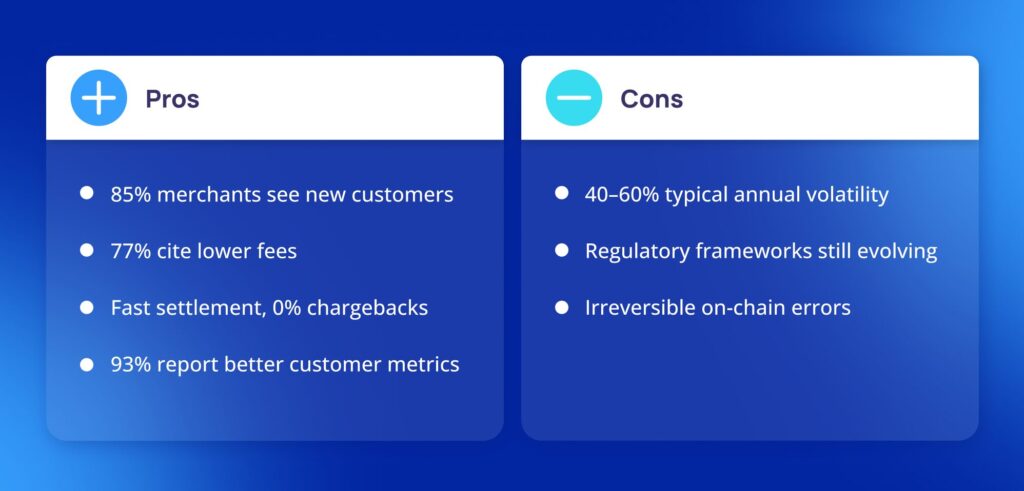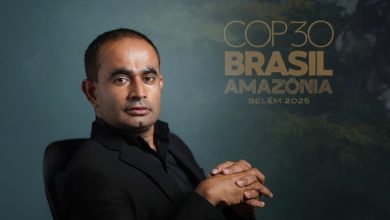Cryptocurrency as a Payment Method: 2025 Market Trends and Insights

By early 2025, over 659 million people hold cryptocurrencies, a 30 percent rise on 2024, while the number of merchants accepting digital assets has nearly doubled to 15,000 in just one year. This shows a huge potential for businesses integrating cryptopayments as a payment method. In this article, we will explore the key trends and hurdles businesses meet while adopting crypto payments, figure out the key numbers to track and discuss how to gain the most benefits from integrating this payment method.
Market Overview and Trends
Cryptocurrency payments have sped up at the international level over the past year. On the merchant side, it is increasing rapidly but from an extremely low base. There are an estimated 15,000 businesses globally that take Bitcoin or other cryptocurrencies now. Market size and transaction value are both increasing in tandem. By 2026, digital currency payments through e-commerce will reach $39 billion. That’s growth, beating most mature payment categories. Industry reports predict crypto payments to double-digit CAGR to 2029.

Adoption is surprisingly industry- and geography-wide. Europe is leading the charge with more than 5,600 companies now accepting crypto as of 2024, and countries like Brazil, India, and the U.S. all have steadily growing numbers of crypto-accepting companies. Even government policy will propel adoption, like El Salvador’s pro-Bitcoin policy saw hundreds of new merchants adopting crypto in 2024. Big e-commerce platforms such as Shopify enable thousands of merchants to accept crypto through integrations, airlines such as Emirates enable cryptocurrency acceptance to buy tickets, and some of the biggest luxury fashion brands now take Bitcoin or Ethereum in stores.
Pros and Cons of Crypto Payments Integration

Benefits:
Access to New Clients and Markets
Crypto reception can attract new tech-savvy and international clients who wish to settle in digital money. In a 2023 survey, 85% of merchants considered crypto settlements as a way to access new clients, out of a global pool of cryptocurrency holders. Payment is borderless, hence it becomes possible for even small-sized businesses to operate globally without customary banking resistances.
Reduced Transaction Charges
Cryptocurrency transactions have the ability to reduce payment processing charges considerably. Compared to the ~3% credit card fees, payment fees for cryptocurrency are much smaller. 77% of businesses are drawn to cryptocurrency because it has reduced transaction costs as blockchain payments cut out several middlemen.
Fast Settlement with No Chargebacks
Cryptocurrency payments settle typically within minutes, compared to days for wire transfers. Payment is final after being confirmed on the blockchain. For merchants, that means no possibility of chargebacks or disputed payments, a significant advantage in fraud-plagued verticals.
Customer Loyalty
Crypto payment demonstrates innovation and ease, which can build customer loyalty. Early adopters are reporting positive results – 93% of crypto-accepting companies see improved customer metrics, and some companies are attributing higher sales to crypto-enabled integration.
Challenges:
Price Volatility
Cryptocurrencies are highly volatile. The value of a coin can move incredibly in short time frames, eroding margins if an entity is holding it. Sudden dips may turn an otherwise profitable sale into a loss if the vendor hasn’t hedged. Volatility is an issue of concern, though, and can be hedged by on-the-fly conversion to fiat or stablecoins.
Regulatory Uncertainty
Cryptocurrency payments regulation is still in its development stages. Countries vary in tax, consumer protection laws, and KYC/AML requirements for cryptocurrency payments, which are usually not defined.
Security and Technical Issues
It requires technical expertise to process crypto payments by securely storing wallets and keys. Companies processing it in-house are exposed to hacks or human errors with no bank to back out of it. Crypto irreversibility may make sending funds to the wrong address mean that it’s gone forever.
Who Could Gain the Most from Crypto Payments?
There are some business types that can gain the most from accepting crypto payments:
SMEs and Online Sellers
Small and medium-sized businesses can gain from the low transaction fees and worldwide accessibility of crypto. To illustrate, an online store business can sell to foreign customers without credit cards with Bitcoin or stablecoins. Lower processing fees favor low-margin companies, and no chargebacks reduce loss for small stores.
High-Risk Businesses
While traditional payment processors reject or overcharge these verticals, crypto could be a solution. Payments are received instantly from all over the world with no intermediaries, and the transactions are irreversible, which eliminates the chargeback problem..
Global Companies
Any company that serves a global client base or is working with tech innovation can benefit. Tech services companies, freelancing websites, and B2B companies cross-border transacting leverage crypto for faster cross-border settlement. To be able to receive a stablecoin, for example, enables a company to be paid USD equivalents by clients in markets where there is limited USD banking.
Generally, the more that a business is burdened with traditional payment limitations, the more such a business has to benefit from the unique benefits of crypto payments. On the other hand, purely domestic businesses with cheap access to card payments might see crypto as a fallback option in the first instance. Each business has to consider its unique requirements, but the following sectors are feeling the most immediate impact from crypto integration.
How to Adopt Crypto Payments Effectively?
For businesses willing to adopt cryptocurrency without the business inconvenience, working with a crypto-friendly payment gateway offers the most convenient solution. The global market for such gateways is projected to grow to USD 1.68 billion by 2025 at a 13.6 % CAGR between 2025-2035, a clear sign that the industry is growing fast. Among the key benefits are:
Easy Integration
API integration cuts time-to-market by up to 75 %, often launching in several weeks instead of months.
Cost Savings
Card fees are 1.5–3.5 % on average, while gateway crypto fees are just a few cents per transaction, providing an average savings of 50 %+ on processing fees to most merchants.
Increased Reach
Merchants who implemented crypto saw 30 % more new foreign customers within six months of starting implementation.
A crypto payment gateway combines the financial and technical benefits of digital-asset acceptance with the convenience and predictability of traditional payment processing. It is the fastest, most fact-based way of going with crypto.
Crypto is becoming a vital part of business operations. The companies that understand its potential and smartly adopt crypto payments to their business models will definitely gain the customer loyalty, higher operational efficiency, as well as stronger potential for growth and expansion.

Source: Cryptocurrency as a Payment Method: 2025 Market Trends and Insights




